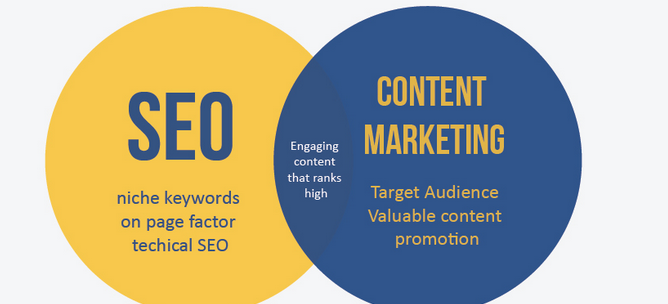.In the digital age, content marketing has emerged as a powerful strategy for improving search engine visibility and driving organic traffic to websites. By creating high-quality, relevant content that resonates with target audiences. Businesses can enhance their online presence, attract more visitors, and ultimately increase conversions. In this guide, we’ll explore the fundamentals of content marketing for SEO. Outlining key strategies and best practices for creating content that ranks well in search engine results and delivers measurable results.

Understanding Content Marketing for SEO
Content creation involves the creation and distribution of valuable, informative, and engaging content to attract and retain a target audience. When executed effectively, content marketing can improve brand awareness, establish thought leadership, and drive customer engagement. In the context of SEO, content marketing plays a crucial role in optimizing website visibility and ranking higher in search engine results pages (SERPs) for relevant keywords and topics.
Keyword Research and Content Planning
A successful content marketing strategy begins with comprehensive keyword research. This is done to identify the terms and phrases that target audiences are searching for online. By understanding the search intent behind these keywords, businesses can tailor their content to address the needs and interests of their audience effectively. Keyword research should inform content planning, helping businesses develop topics and themes that align with their target keywords and audience preferences.
Creating High-Quality Content
High-quality content is the cornerstone of effective content marketing for SEO. Content should be well-researched, informative, and valuable to the target audience. It should also be engaging and visually appealing, incorporating multimedia elements such as images, videos, and infographics where appropriate. Additionally, content should be optimized for search engines, incorporating target keywords naturally throughout the text. And also using relevant headings, meta tags, and alt text for images.
Optimizing Content for Search Engines
Optimizing content for search engines involves implementing on-page and off-page SEO techniques. Done to improve visibility and ranking in search engine results. On-page SEO includes optimizing title tags, meta descriptions, and URL structures. As well as ensuring proper keyword placement and internal linking within the content. Off-page SEO involves building backlinks from authoritative websites and engaging in social media promotion to increase visibility and drive traffic to the content.
Measuring and Analyzing Performance
To gauge the effectiveness of content marketing efforts, businesses should regularly monitor and analyze key performance metrics such as website traffic, keyword rankings, and conversion rates. Tools like Google Analytics and Google Search Console provide valuable insights into how content is performing in search results and how users are interacting with it. By tracking these metrics over time, businesses can identify areas for improvement and refine their content marketing strategies accordingly.
Conclusion
In conclusion, content marketing is a powerful strategy for improving search engine visibility, driving organic traffic, and achieving business objectives. By creating high-quality, relevant content that resonates with target audiences and optimizing it for search engines, businesses can enhance their online presence and attract more visitors to their websites. With careful planning, execution, and measurement, content marketing for SEO can deliver tangible results and contribute to long-term success in the digital marketplace.

